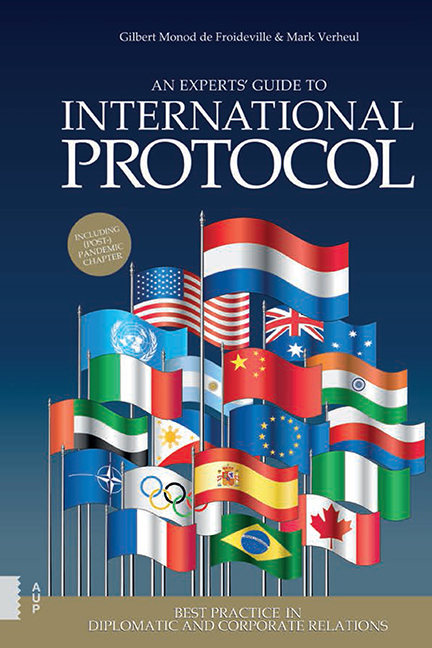Book contents
- Frontmatter
- Contents
- Preface to the original edition by His Royal Highness Prince Carlos de Bourbon de Parme
- Prologue
- Acknowledgements
- 1 International Protocol
- 2 Precedence
- 3 Seating Arrangements and Order of Processions
- 4 Flag Protocol
- 5 Invitations and Dress Codes
- 6 Gifts and Honours
- 7 Ceremonies
- 8 The Protocol Officer
- 9 Guest and Host
- 10 Protocol and Stakeholder Engagement During and after the COVID-19 Pandemic
- Authors’ Biographies
- Bibliography
- Websites
- Illustrations and Photographs
- Index
Prologue
Published online by Cambridge University Press: 27 May 2021
- Frontmatter
- Contents
- Preface to the original edition by His Royal Highness Prince Carlos de Bourbon de Parme
- Prologue
- Acknowledgements
- 1 International Protocol
- 2 Precedence
- 3 Seating Arrangements and Order of Processions
- 4 Flag Protocol
- 5 Invitations and Dress Codes
- 6 Gifts and Honours
- 7 Ceremonies
- 8 The Protocol Officer
- 9 Guest and Host
- 10 Protocol and Stakeholder Engagement During and after the COVID-19 Pandemic
- Authors’ Biographies
- Bibliography
- Websites
- Illustrations and Photographs
- Index
Summary
In the spring of 2001, a long-lasting collaboration began between Gilbert Monod de Froideville and Mark Verheul. It was at the wedding of TTRRHH Prince Constantijn and Princess Laurentien of the Netherlands, where Gilbert was responsible for the overall programme as Master of Ceremonies and Mark assisted him, along with many others from the Protocolbureau, as usher in the Grote Kerk in The Hague. Shared involvement in several other royal events followed over the years, and after Mark's graduation in Sydney in 2005, he started working as a right-hand to Gilbert at Noordeinde Palace in The Hague. Gilbert retired a year and a half later and had the privilege of working in the Middle East as consultant and trainer for a royal court, an experience that provided him with valuable insights into the Middle Eastern culture. Mark joined him there in 2008, and it was then that the initial plans arose to write a book together, but it still took a couple of years before actually deciding to give it a try. In March 2014, on the eve of the start of the Nuclear Security Summit in The Hague, Gilbert was one of Eva Jinek's guests on the Dutch talkshow Jinek to elaborate on the many protocol aspects related to such a high-level conference with world leaders attending from around the globe. After the programme she mentioned that Gilbert should consider writing a book and that was the trigger for a brainstorm with Mark about what such a book should cover.
They soon agreed that the book should give an overview of the implementation of protocol as practiced around the world, since every organisation and government is dealing with aspects of international protocol as an instrument of relationship management. In this respect, they talked about the importance of diplomatic hospitality in international relations and international business, seen from a protocol perspective. And although modern life grows increasingly casual, in many sectors, protocol still reigns supreme. The book therefore offers an overview of its associated practices, including those found within the context of diplomatic relations and the business world. Focusing on a wide range of countries and cultures, the book covers topics like precedence, seating arrangements, the history and use of flags, ceremonies, invitations, dress codes, gifts, and decorations.
- Type
- Chapter
- Information
- An Experts' Guide to International ProtocolBest Practices in Diplomatic and Corporate Relations, pp. 11 - 12Publisher: Amsterdam University PressPrint publication year: 2021

